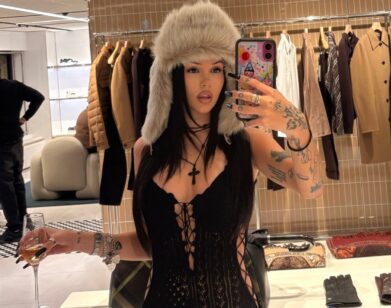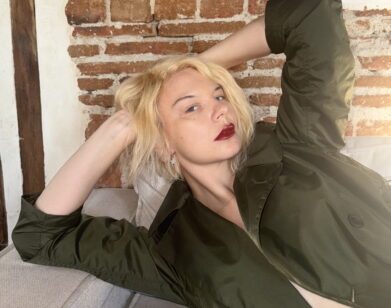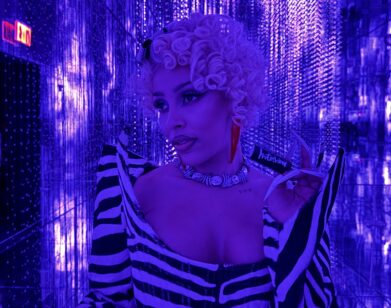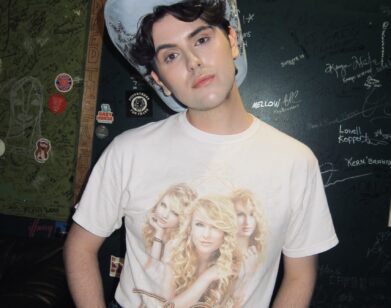Fuck Buttons in Focus
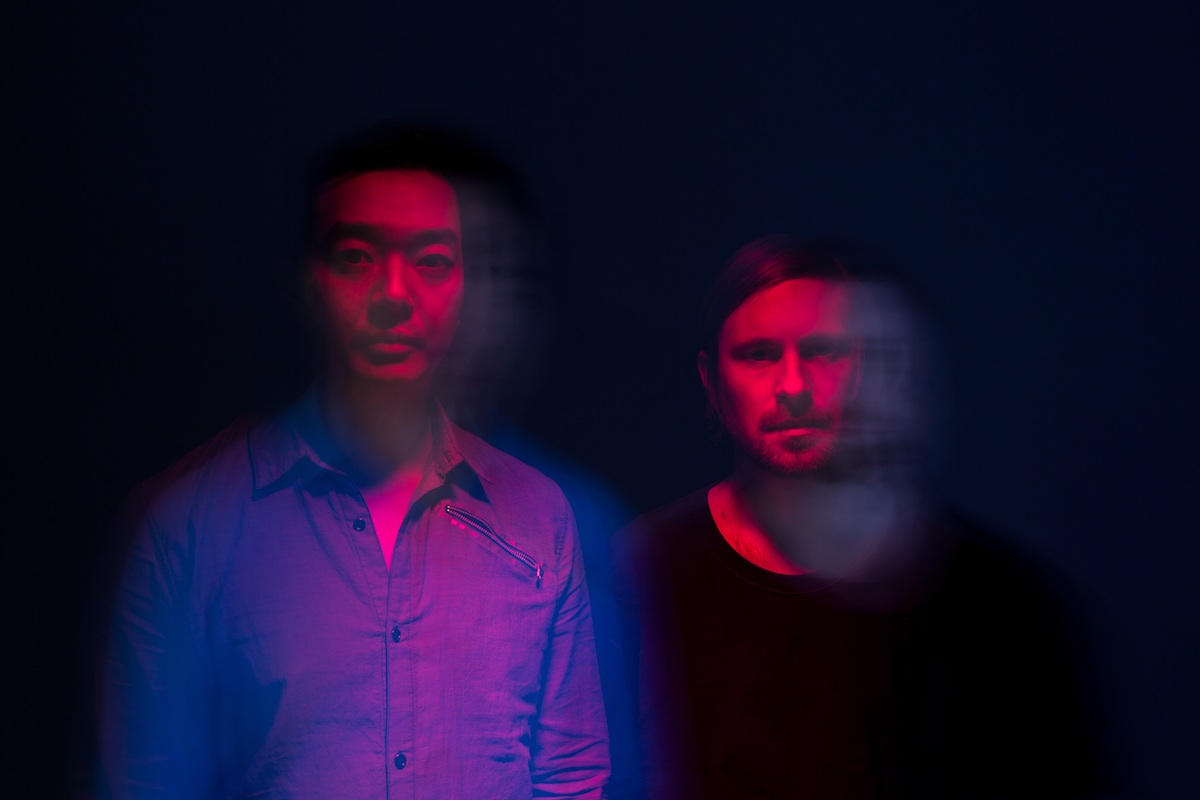
ABOVE: FUCK BUTTONS’ ANDREW HUNG (LEFT) AND BENJAMIN JOHN POWER
There was a moment during last summer’s Olympic Ceremonies in which music geeks across the world were collectively floored: the Fuck Buttons song “Olympians” was blasting from the stadium’s gargantuan sound system. To put that in perspective, a band with a moniker that’s unprintable in most publications—not to mention the official Olympic album—was being used to soundtrack one of the most widely viewed events in world history.
Before its sudden exposure, though, the Bristol duo comprised of Andrew Hung and Benjamin John Power had been steadily gaining fans and influence. Fuck Buttons’ music borrows from noise-rock and drone, but adds clear hooks and a world-expanding sense of awe. Favoring major chords and thunderous percussion, the band has been compared to everyone from post rockers like Godspeed You! Black Emperor to the movie soundtracks of John Williams. “I guess what the genre of ‘noise’ gave us was a license to try whatever we wanted,” says Hung. “For us, it was using a lot of unpredictable textures—that’s what interests us.”
For the band’s new record, Slow Focus—its first since 2009—Hung and Power approached their songwriting in much same way they always have, by jamming together in the studio. “It makes the writing process a whole lot quicker, because you are able to engage what the other person is thinking,” says Hung. “It’s just more fun that way, as well.” The result, however, is distinctive steps away from the ever-escalating crescendos of Tarot Sport. Though the big arrangements are still present, things have a distinctively darker lean this time around, with tracks that recall everything from hip-hop to dance music. Interview caught up with Hung to talk his band’s progression, watching the Olympics, and the British phenomenon of boot sales.

NATHAN REESE: It’s been a while since your last record. Has your approach toward changed much over the last four years?
ANDREW HUNG: I mean, naturally things have changed. The equipment accumulated has grown and things have been discarded as well. So that’s going to affect the sound a bit. Where we are as musicians has changed as well… It had been a few years [between albums] when we started working again.
REESE: When you went back into the studio for this one, was there anything that you wanted to accomplish specifically?
HUNG: Not really. Normally we don’t talk about intentions before we make anything, ’cause it’s not really fun to do that. We can’t just start writing until something starts happening. And this time was no different than that.
REESE: Compared to the last record, the new one seems to have a lot more sonic variety.
HUNG: We’ve become more refined, which actually opens up a lot of possibilities. So that’s possibly why there are a bit more different varieties of textures in the music on the new record. The more you do anything, the more confident you are with it, and that’s what happened with this.
REESE: Was there anything that you were inspired by specifically that made it into the new record?
HUNG: Not really. We are at the stage where we’ve been doing it for years now. The music has it’s own momentum, so we don’t really need to look to outside influences. It continues very naturally and easily for us.
REESE: Going to last year’s big news, when you were featured in the Olympics, what did it feel like to learn that your music was being featured in the Opening Ceremony?
HUNG: It was incredible, really. At the time, when we got asked to do it, it was like with anything really. You get asked to do it, and it’s just some bloke asking you, “Can you do this?,” and you are like, “Yeah, sure.” You don’t really think anything about it. The point at which it hits you in the face is when it actually happens. For instance, we were playing a show a couple of weeks ago at Primavera, and it was massive. But at the time it was just an email asking, “Do you want to do Primavera?” and it’s like, “Yes, okay.” And then you are confronted by 10,000 people—that’s when what you’re doing suddenly hits you in the face. That was like the Olympics. You didn’t really think about it, but then on the night our music comes up, my phone goes mental, and it’s this massive production. The whole world is seeing it. That’s when it all hits you. It was an incredible experience.
REESE: How did it wind up getting picked in the first place?
HUNG: It was Rick [Smith] from Underworld. They were working with Danny Boyle at the time, programming the music for it, but it was him who approached us.
REESE: Considering that you founded a band with the name like Fuck Buttons, getting into the ceremonies seems all the more unlikely.
HUNG: It says that it is not written what is possible. Historically, you think that a band with a slur word in the name wouldn’t be able to get too far, and I think everyone thought that—I thought that. But I think what the Olympics shows is that, yeah, there’s possibility.
REESE: The new record definitely seems to have a darker sound than the last one. Do you think that reflects the state of mind the band was in?
HUNG: I don’t think it’s reflecting anything. I guess as musicians and artists, the way a certain work evokes a reaction is separate to your actual being. That’s why one is able to appreciate sad art or depressing work or things like that. It’s not like people want to feel sad. It is an appreciation of that evocation. I think that’s what we were getting from music. It’s fun to get that feeling. It’s not necessarily that it’s present in our lives or that we want to feel that way.
REESE: How has it been transferring the new material to a live setting?
HUNG: It’s funny. When you write these songs, we’re technically able to play them live as soon as we’ve written them, because we write them in this jamming capacity. But they’re still written inside these small little rooms. So when you take them to a massive stage with a huge PA playing out, the experience is completely different. There’s a lot more impact and power behind that. So playing the new tracks live took us completely by surprise, actually. I guess because we’ve been writing for a few years and then to play them at that volume… but we’re playing two new tracks at the moment, and they’re really fun to play live.
REESE: For your last record, you used Andrew Weatherall as a producer. Why did you decide to self-produce this time?
HUNG: The production side of the process is really important to our music. Once a track had been written, we knew exactly how it would sound as opposed to how it sounds in recording format. It was just logical for us to take it to the next stage and learn how to record and produce ourselves.
REESE: For the first records, you used some nontraditional gear, like Fisher-Price toys. Has the gear that you’ve been using changed over the years?
HUNG: We’re always looking for new stuff, and we’re discarding stuff as well. We’re attentively moving into expensive gear. I’m still interested in rubbish stuff, and I’m still scouring… do you have car boot sales?
REESE: I don’t think so. What are those?
HUNG: I guess they’re like tabletop sales or flea markets. I’m constantly scouring them, and I really love walking around trying to find new stuff for the band. For instance, in my living room, I still have 40 keyboards or so accumulated in there. We’re always looking for stuff, possibly to the detriment of our living space. [laughs]
REESE: Is there anything you’ve picked up recently that you’ve been excited to use?
HUNG: Not really. It’s nice not to be attached to things; that’s why I like having stuff and being able to discard it. That’s why I don’t like expensive stuff. [laughs]
REESE: When you record, do you think about where the listener is actually going to be experiencing the album? Headphones? Driving in a car?
HUNG: No, not really. The environments we enjoy listening to it are all the ones you mentioned, actually. There have been some incredible things that people have said to us. I had this guy who said he was watching a meteor shower lying down on a frozen lake. I can’t vouch if it’s true or not, but that in itself is an amazing image for me, regardless of what he was listening to.
REESE: Yeah, that’s great. I think that image is what people get in their heads anyway when they’re hearing the music.
HUNG: I love that. That’s a massive compliment.
REESE: So, what’s next for the band?
HUNG: A lot of touring, we’re just starting to put everything in place. Right now it’s a lot of emailing and a lot of touring in the latter part of the year and into the next year as well.
REESE: You mentioned the Primavera show—I saw footage of that, and there’s this amazing stage show you have now. The lights were spectacular.
HUNG: We’re working with lighting designers and visual people as well. We’re still in the process of designing the live show at the moment, but the potential of it is incredible for us. We have this idea… I’m trying not to give too much away, because I’m not sure which direction it will go. But we have an idea, and now it’s being expanded. It’s already at this phase where we’re pretty pleased with it.
SLOW FOCUS IS OUT TODAY. FOR MORE ON THE BAND, VISIT ITS WEBSITE.

